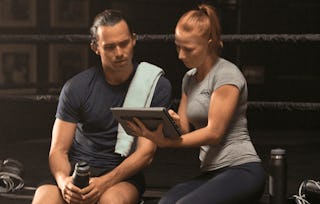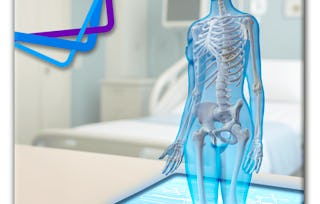Managing Your Health: The Role of Physical Therapy and Exercise will introduce learners to the concepts and benefits of physical therapy and exercise. Over six weeks learners will explore:

Managing Your Health: The Role of Physical Therapy and Exercise

Managing Your Health: The Role of Physical Therapy and Exercise



Instructors: Dina Brooks, PhD, PT
59,039 already enrolled
Included with
805 reviews
Skills you'll gain
Details to know

Add to your LinkedIn profile
See how employees at top companies are mastering in-demand skills

There are 6 modules in this course
This module will introduce you to concepts of physical activity and exercise. It will share some important information on the benefits of physical activity with you and also identify ways that you can assess your own physical activity levels. We'll also ask you to reflect on your own activity level and ask you to consider if you think you should modify your activity level. We've prepared a great module for you. We have an interesting lecture by Physiotherapist Agnes Makowski, an entertaining video, and some questionnaires for you to complete. We've also prepared a link to the Canadian Physical Activity Guidelines which we hope you find informative. Lastly, we'll end with a quiz. We hope you enjoy it and as always, if you have any questions, please don't hesitate to post them to the discussion board. If you have any questions about the course please contact brenda.mori@utoronto.ca
What's included
3 videos7 readings4 assignments1 peer review3 discussion prompts
Welcome to Module 2! Cardiovascular Disease is one of the most frequent diseases among Canadians. There are many risk factors for CV disease and Inactivity is one of the important ones. In this module you will be guided to do a couple of things. We will ask you to take a risk assessment by the Heart and Stroke Foundation of Canada self test. Then, you will meet Debbie Childerhose who is a physiotherapist and an expert in Cardiovascular disease. We will direct you to watch a video on the importance of exercise and ask you to reflect on your risk factors and any lifestyle or behaviour changes you might consider making. We will share some additional resources with you and then you will be directed to take the quiz for the module. We hope you enjoy this module!
What's included
2 videos3 readings1 assignment1 peer review1 discussion prompt
Welcome to Module 3! In this module you will be guided to do a couple of things. First, we want you to reflect if you are doing enough exercise to meet the Osteoporosis Canada recommendations for the amount of exercise people with osteoporosis should do. Next, we’ll suggest that you do a Calculate your calcium intake online survey. This will give you an idea if you are getting enough calcium in your diet and they’ll make some suggestions for you. Next, you’ll get to meet Dr. Judi Laprade who has prepared a lecture for us on osteoporosis and exercise. The 4th component will direct you to watch videos on how to safely do everyday activities. We’ll share some additional resources with you and then you will be directed to take the quiz for the module. We hope you enjoy this module!
What's included
2 videos5 readings1 assignment3 discussion prompts
Welcome to Module 4. In this module you will be asked to reflect on your potential experience of knowing someone who might have had cancer and how they incorporated exercise into their journey. You’ll get to meet Kristen McDonnell who is our guest lecturer for this session. Next, we’ll ask you to watch a video by Dr. Mike Evans on cancer related Fatigue, then we will guide you into reading some additional information about cancer and physical activity from the Canadian cancer Society. Lastly, you’ll need to take the quiz if you’d like to qualify for the certificate for this MOOC.
What's included
2 videos2 readings1 assignment2 discussion prompts
Did you know that many injuries resulting from playing sports can be prevented? Do you know the best ways to treat common sport-related injuries? In this module, we will help you understand the importance of injury prevention in sport and how to deal with some of the more common ones. First, we will get you to take a quiz to see what you already know about common sports injuries. Then we will introduce you to Meghan Buttle, a sport physiotherapist with expertise in managing sport injuries. We will then get you to take a second quiz to test your knowledge again. Remember, you'll need to take these quizzes if you'd like to qualify for the certificate for this MOOC. So, listen carefully to Meghan's video as she talks about the role of physical therapists in preventing and managing sports injuries.
What's included
2 videos1 reading1 assignment1 discussion prompt
Welcome to module 6: Exercise and Arthritis. Do you or someone you know have aches and pains in your joints because of arthritis? Did know that exercise is good for you especially if you have arthritis? In this module we will guide you through some of the facts about arthritis and about why exercise is so important for keeping you healthy especially if you have arthritis. Leslie Soever, a physiotherapist with expertise in arthritis will tell you more about this in her video. But before you meet Leslie, we will ask you to do a quiz to see what you already know about arthritis. After you listen to Leslie’s talk, we will get you to complete a scavenger hunt to find exercise recommendations on specific arthritis websites. This will hopefully get you more familiar with these guidelines. Finally, at the end of this module we’ll quiz you again about your knowledge of exercise for people with arthritis, and especially about the role of a physiotherapist in helping people with arthritis to exercise.
What's included
2 videos2 readings2 assignments1 peer review1 discussion prompt
Instructors



Offered by
Explore more from Patient Care
 Status: Free Trial
Status: Free TrialNational Academy of Sports Medicine
 Status: Free Trial
Status: Free TrialNiel Asher Education
 Status: Free Trial
Status: Free Trial Status: Free Trial
Status: Free Trial
Why people choose Coursera for their career

Felipe M.

Jennifer J.

Larry W.

Chaitanya A.
Learner reviews
- 5 stars
76.89%
- 4 stars
18.38%
- 3 stars
2.48%
- 2 stars
0.86%
- 1 star
1.36%
Showing 3 of 805
Reviewed on Jan 27, 2026
Loved learning about this topic and the information was very clear and relevant. Unfortunately, some of the links to various resources were outdated which made some things challenging.
Reviewed on Sep 20, 2024
It was a great opportunity to learn from such prestigious university and platform. Really informative and added a great value to my knowledge.
Reviewed on Nov 8, 2023
Very informative in things to adjust and add to daily routines. And advice to health colleagues, so they can make the world a better place, and make their patients as happy as they deserve.

Open new doors with Coursera Plus
Unlimited access to 10,000+ world-class courses, hands-on projects, and job-ready certificate programs - all included in your subscription
Advance your career with an online degree
Earn a degree from world-class universities - 100% online
Join over 3,400 global companies that choose Coursera for Business
Upskill your employees to excel in the digital economy
Frequently asked questions
To access the course materials, assignments and to earn a Certificate, you will need to purchase the Certificate experience when you enroll in a course. You can try a Free Trial instead, or apply for Financial Aid. The course may offer 'Full Course, No Certificate' instead. This option lets you see all course materials, submit required assessments, and get a final grade. This also means that you will not be able to purchase a Certificate experience.
When you purchase a Certificate you get access to all course materials, including graded assignments. Upon completing the course, your electronic Certificate will be added to your Accomplishments page - from there, you can print your Certificate or add it to your LinkedIn profile.
Yes. In select learning programs, you can apply for financial aid or a scholarship if you can’t afford the enrollment fee. If fin aid or scholarship is available for your learning program selection, you’ll find a link to apply on the description page.
More questions
Financial aid available,
¹ Some assignments in this course are AI-graded. For these assignments, your data will be used in accordance with Coursera's Privacy Notice.

